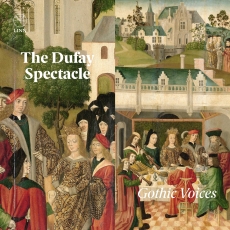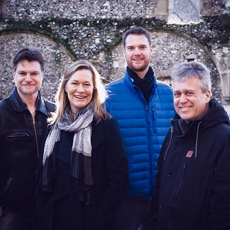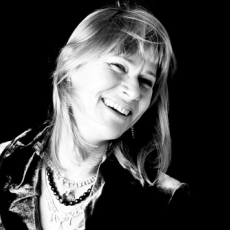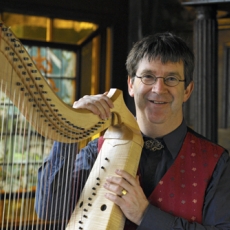Gothic Voices - The Dufay Spectacle - musica Dei donum
The second production under review here sheds light on a different side of Dufay's oeuvre and activities. He was a much sought-after composer and stayed at several places, such as Bologna, Rome and Savoy. The versatility of his oeuvre reflects the importance of music in every part of life, from the church to the privacy of the homes of the aristocracy. The ensemble Gothic Voices has recorded a programme which pays attention to that versatility, appropriately called 'The Dufay Spectacle'. The character of the programme is described in the booklet. "It is New Year's Day, and a special wedding is happening. In a magnificent banqueting hall the noble guests are gathering and exchanging courtesies, musicians are taking their places, keen to enhance the occasion with their fine voices and newly invented instruments. Guest of honour: France's greatest proto-Renaissance composer: Guillaume Dufay. In this spectacle of his musical versatility this sequence of chansons and motets stages an imaginary scene, set maybe somewhere in northern Italy, maybe sometime in the 1470s, at the end of his life". The lack of a precise time and place allows for a variery of pieces, which are not necessarily connected.
In accordance with the description, the starting point is the song for New Year's Day, Ce jour de l'an: "This new year's day I would like to rejoice, to sing, to dance, and show a happy face, so to maintain the joyful appearance that all lovers are required to maintain". It is the thread in this programme. It opens the procedings in a short monophonic version, and also two of the sections of the programme in improvisations by members of the ensemble. The full three-part version closes the programme.
The first section is called "The Welcome". After the New Year's Day song we hear Vasilissa, ergo gaude/Concupivit rex decorum, written in honour of Cleofe Malatesta, bride of Theodore Palaiologos, before their wedding in 1421. As in many pieces on this disc the various voices have their own text. "Enter, gentle lovers", is the opening line of the three-part chanson Entre vous, gentils amoureux.
The second section is called A Reflection, with various chansons about love, in most cases the dark sides of it, such as Je me complains piteusement: "I complain pityfully to myself, all alone, more than to anyone, of the difficulty, pain and torment, which I suffer more than I say".
The third section is entitled "Solemn Celebration", and here we hear also some sacred pieces. It opens with Jane Achtman, improvising over a single line from Ce jour de l'an, and then we hear the four-part motet O Sancte Sebastiane, in which every voice (cantus I and II, contratenor and tenor) has its own text. It is followed by two instrumental arrangements of Dufay's ballade - included in Cut Circle's recording - Se la face ay pale, both taken from the Buxheimer Orgelbuch. And then we hear another famous piece, Vergene bella, in honour of the Virgin Mary, on a text by Petrarch. A chanson and further motets complete this section.
The last episode is called "Playful Celebration", and this is mostly devoted to chansons about love, this time of a more happy nature.
This disc is a nice survey of Dufay's mastery of the genre's of his time. The instrumental arrrangements attest to the popularity of his music, and his reputation as a composer. The performers have done us a favour by not confining themselves to Dufay's best-known pieces, although it needs to be said that Dufay's secular music does not that often appear on disc and his sacred music seems to be much better known. The mixture of voices and instruments is convincing; the instruments used here were common at the time, and their contributions are never exaggerated. The various improvisations refer to a then wide-spread practice. The singing and playing are fine, and with this disc Gothic Voices has given us a little over an hour of high-level musical entertainment.



